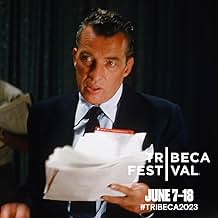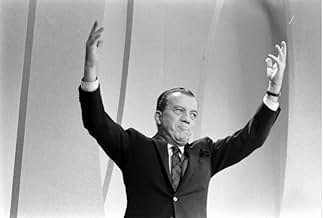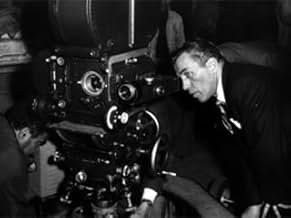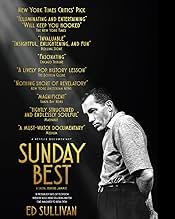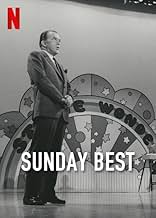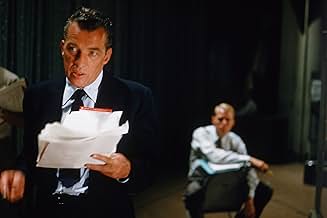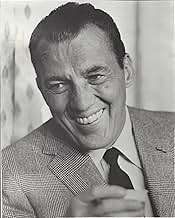IMDb RATING
7.8/10
829
YOUR RATING
Ed Sullivan broke barriers by booking Black artists on his Sunday night variety show. This documentary spotlights the TV pioneer's legacy of equality.Ed Sullivan broke barriers by booking Black artists on his Sunday night variety show. This documentary spotlights the TV pioneer's legacy of equality.Ed Sullivan broke barriers by booking Black artists on his Sunday night variety show. This documentary spotlights the TV pioneer's legacy of equality.
The Beatles
- Themselves
- (archive footage)
James Brown
- Self
- (archive footage)
Diahann Carroll
- Self
- (archive footage)
Johnny Carson
- Self
- (archive footage)
Nat 'King' Cole
- Self
- (archive footage)
Sammy Davis Jr.
- Self
- (archive footage)
Jackson 5
- Themselves
- (archive footage)
Mahalia Jackson
- Self
- (archive footage)
John F. Kennedy
- Self
- (archive footage)
Martin Luther King
- Self
- (archive footage)
Gladys Knight
- Self
- (archive footage)
Rosa Parks
- Self
- (archive footage)
Elvis Presley
- Self
- (archive footage)
Bill Robinson
- Self
- (archive footage)
Featured reviews
Many of us remember The Ed Sullivan Show growing up - the program that introduced us to the Beatles. Elvis, opera, Topo Gigio, and dozens upon dozens of black entertainers during profound civil unrest in our country.
Today the unrest is of a slightly different kind - but to hear someone in the '60s claim that blacks were taking our jobs had a very familiar ring to it.
Ed Sullivan, a columnist who became a television icon - pioneered featuring black artists on his show: Stevie Wonder, Pearl Bailey, Ike and Tina, Nina Simone, the Supremes, Diahann Carroll, the Jackson 5, Harry Belafonte, the Temptations- giving many artists their start.
Fortune favors the bold, and there was no one more fearless than Ed Sullivan, who didn't hesitate to bring black artists into Southern homes.
What impressed me was how he held the artists' hands, patted them on the back, hugged them, at a time when some people would find that shocking.
Born in Harlem, then heavily populated by the Irish, Sullivan had an open-minded dad who knew minorities coming into this country had always suffered.
I was left asking myself what happened to courageous people like Sullivan, like Carl Laemmle who founded Universal Studios and then saved 308 Jewish families from the Holocaust, like Rosa Parks, like Charles Shultz, who refused to remove a black child from a Peanuts cartoon, who fought for what they knew was right, who refused to be cowed or intimidated. Today I see a lot of fear.
I highly recommend this documentary for its wonderful memories and a reminder that once there were people who bucked the system.
Today the unrest is of a slightly different kind - but to hear someone in the '60s claim that blacks were taking our jobs had a very familiar ring to it.
Ed Sullivan, a columnist who became a television icon - pioneered featuring black artists on his show: Stevie Wonder, Pearl Bailey, Ike and Tina, Nina Simone, the Supremes, Diahann Carroll, the Jackson 5, Harry Belafonte, the Temptations- giving many artists their start.
Fortune favors the bold, and there was no one more fearless than Ed Sullivan, who didn't hesitate to bring black artists into Southern homes.
What impressed me was how he held the artists' hands, patted them on the back, hugged them, at a time when some people would find that shocking.
Born in Harlem, then heavily populated by the Irish, Sullivan had an open-minded dad who knew minorities coming into this country had always suffered.
I was left asking myself what happened to courageous people like Sullivan, like Carl Laemmle who founded Universal Studios and then saved 308 Jewish families from the Holocaust, like Rosa Parks, like Charles Shultz, who refused to remove a black child from a Peanuts cartoon, who fought for what they knew was right, who refused to be cowed or intimidated. Today I see a lot of fear.
I highly recommend this documentary for its wonderful memories and a reminder that once there were people who bucked the system.
What a great tribute to Ed Sullivan as well as all of the Black artists. I remember watching Ed his last few years and he had a lot of guests that were singers as well as dancers, acrobats, comedians and everything else you can image. I had no idea he was such a champion for the colored artists and that he hand picked every act! It's safe to say that many of the colored artists in the 60's owe Ed their careers.
Barry Gordy Jr and Motown was especially appreciative.
I knew a little about his back ground, getting started as a sports writer and columnist and then moving up the ladder and finally getting chosen by CBS to be the host of his own show and changing the way we spent Sunday nights..
Barry Gordy Jr and Motown was especially appreciative.
I knew a little about his back ground, getting started as a sports writer and columnist and then moving up the ladder and finally getting chosen by CBS to be the host of his own show and changing the way we spent Sunday nights..
I grew up watching Ed Sullivan and I knew I would see people who looked like me. I didn't think about it much, I just loved it. When I was older, I could appreciate his bravery in the face of blatant racism. After seeing this, I will always honor his memory. He was a great man who stood tall in his convictions. He deserves respect and glory.
Even though I've heard Ed Sullivan's name for as long as I can remember, when I became aware of this documentary I realized I knew almost nothing about him. After an hour and twenty minutes, I still don't know a lot.
The producers chose to focus almost exclusively on Mr. Sullivan's contribution to tearing down racial barriers in the US. I didn't realize that he had done as much, or had been so resolute about it, so that was indeed enlightening.
But we're talking about a man who introduced The Beatles to the US, and played a big part in Elvis Presley's growing popularity as well. And these are just the two things I knew about him going into the documentary-- I'm sure there are more.
But we didn't get to hear about those. The Beatles and Elvis were given their requisite minute (or less) of screen time, and then it was back to more commentary about racial strife in the country during the time The Ed Sullivan Show was on the air.
If the title of this effort accurately reflected its content, I would call it a good documentary. But I went into it expecting to learn more about the man and his show, and in the end all I learned was how committed he was to ending racial inequality.
From this documentary, it's clear that was very important to him. But that's obviously that's not all the man was about. Sadly, we didn't get to learn about the other aspects of his life from this presentation.
I'm glad I watched it, but I wouldn't watch it again. I came away wishing I knew more about him than was shown here, and to me that makes this effort a somewhat disappointing watch.
The producers chose to focus almost exclusively on Mr. Sullivan's contribution to tearing down racial barriers in the US. I didn't realize that he had done as much, or had been so resolute about it, so that was indeed enlightening.
But we're talking about a man who introduced The Beatles to the US, and played a big part in Elvis Presley's growing popularity as well. And these are just the two things I knew about him going into the documentary-- I'm sure there are more.
But we didn't get to hear about those. The Beatles and Elvis were given their requisite minute (or less) of screen time, and then it was back to more commentary about racial strife in the country during the time The Ed Sullivan Show was on the air.
If the title of this effort accurately reflected its content, I would call it a good documentary. But I went into it expecting to learn more about the man and his show, and in the end all I learned was how committed he was to ending racial inequality.
From this documentary, it's clear that was very important to him. But that's obviously that's not all the man was about. Sadly, we didn't get to learn about the other aspects of his life from this presentation.
I'm glad I watched it, but I wouldn't watch it again. I came away wishing I knew more about him than was shown here, and to me that makes this effort a somewhat disappointing watch.
I wasn't around for The Ed Sullivan Show, but I always heard his name being tied to the Beatles and Elvis. What surprised me was how much he did for Black artists at a time when they didn't have many chances to be seen. He made sure groups like The Supremes, The Temptations, Stevie Wonder, and so many others got the spotlight they deserved. He had a particular eye for talent.
I also learned that he grew up in Harlem and faced discrimination as an Irish-American, which may have helped shape his perspective and his drive in the entertainment world. As someone who didn't know much about this part of music history, the film was really eye opening. Honestly, I wish we had something like his show today.
I also learned that he grew up in Harlem and faced discrimination as an Irish-American, which may have helped shape his perspective and his drive in the entertainment world. As someone who didn't know much about this part of music history, the film was really eye opening. Honestly, I wish we had something like his show today.
Did you know
- TriviaSunday Best producer Margo Precht Speciale is also the granddaughter of legendary TV host Ed Sullivan.
Details
- Release date
- Country of origin
- Official site
- Language
- Also known as
- Sunday Best
- Production companies
- See more company credits at IMDbPro
- Runtime
- 1h 30m(90 min)
- Color
Contribute to this page
Suggest an edit or add missing content

